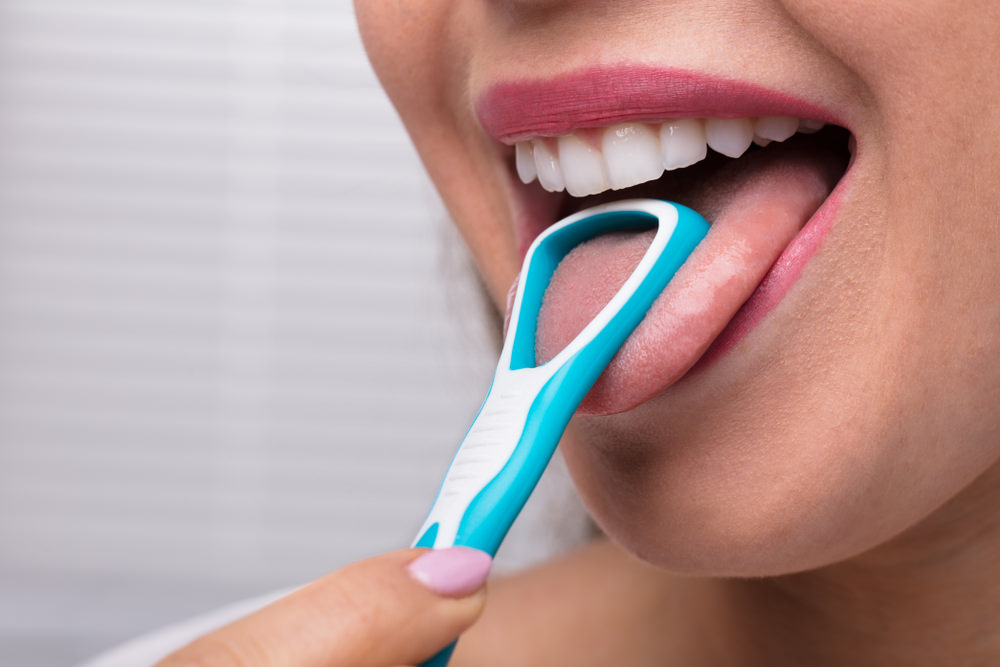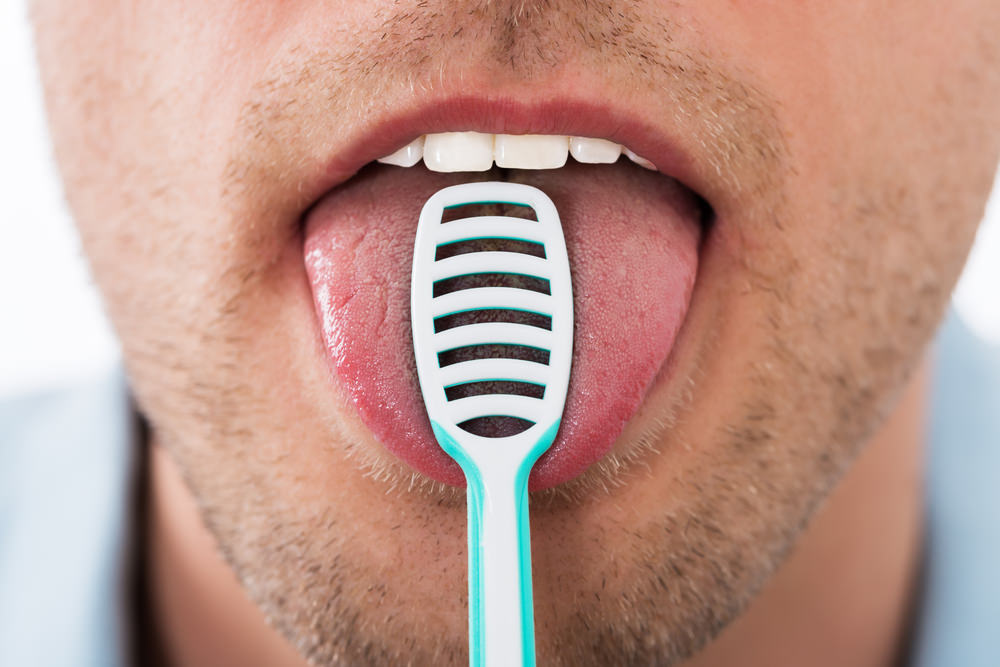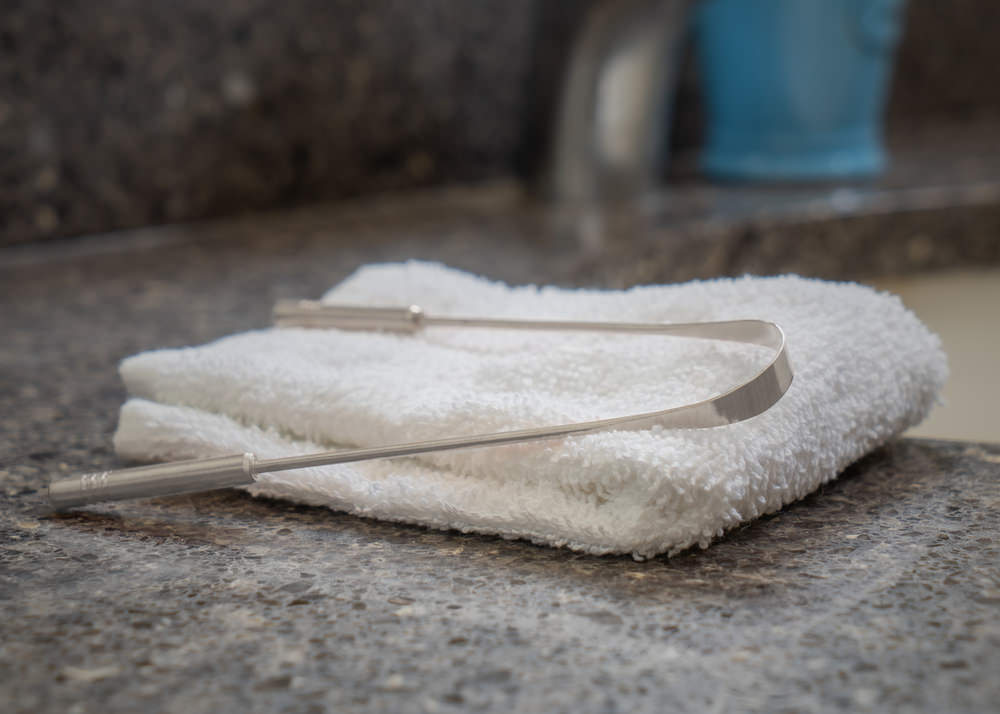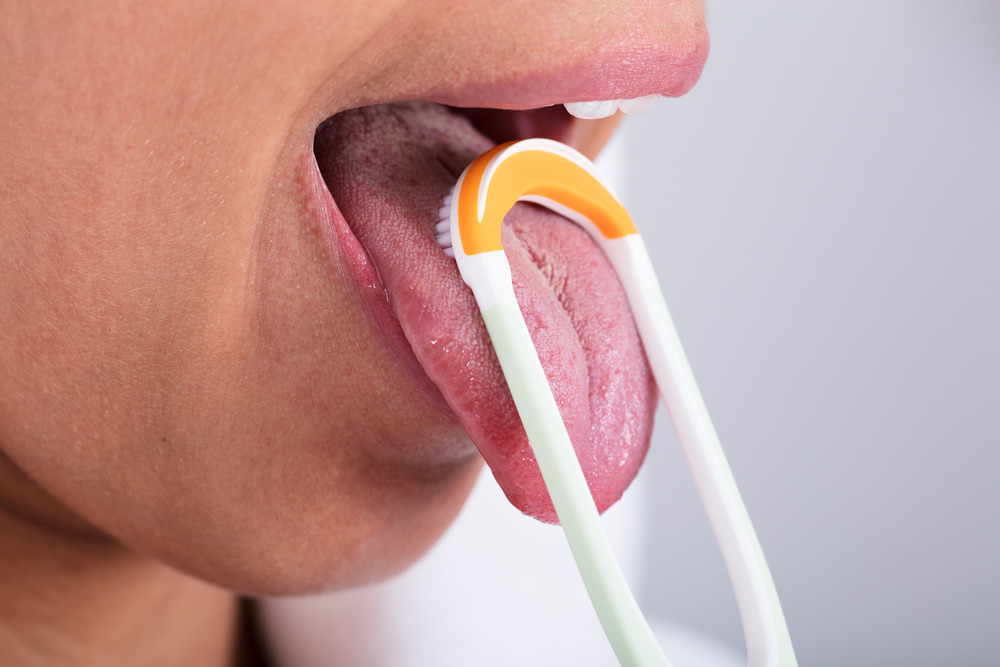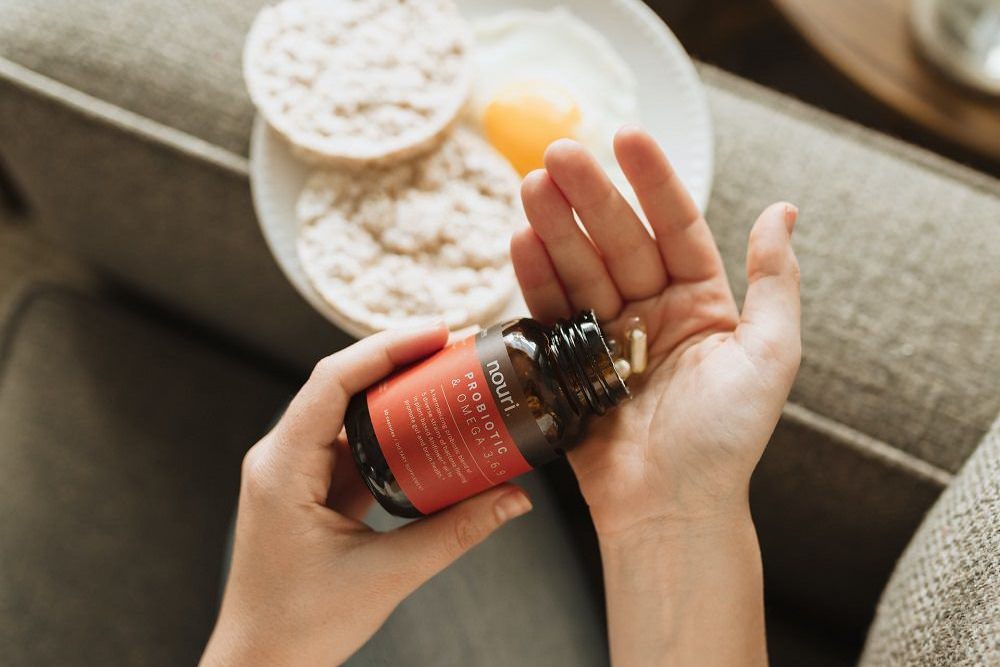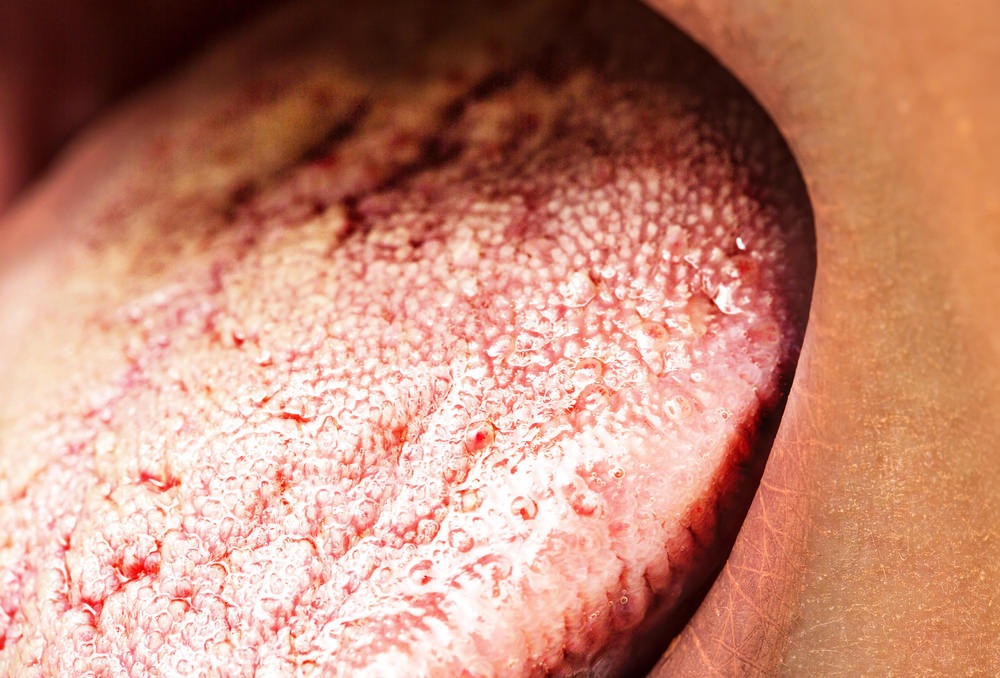Tongue Scraping – All Benefits Discussed
As well as brushing your teeth and flossing, you should add tongue scraping or cleaning to the list of things to do to care for your oral health.
Referred to either as a Tongue Scraper or Tongue Cleaner, they provide additional dental hygiene and improve the cleanliness of your tongue by removing bacteria and buildup on your tongue.
So, how do you use a tongue scraper?
How to Use a Tongue Scraper
It takes under two minutes to use a tongue scraper.
Follow these steps:
- After brushing and flossing your teeth, stand in front of a mirror, widely open your mouth, and stick out your tongue.
- Lightly place the rounded edge of the tongue scraper as far towards the back of your tongue as you can.
The closer towards the back of your tongue you get, the more you may notice your gag reflex.
If this concerns you, it may help to start in the middle of your tongue.
With time you will be able to move the tongue scraper further backwards, as you will no longer be gagging. - Slowly pull the scraper from the back of your tongue to the front.
NEVER push the scraper from the tip of your tongue backwards – ALWAYS pull it from the back to the tip. - When you first start scraping, you may notice yellow debris or blood on the tongue scraper after each scrape.
This is totally normal. Just use a flannel or tissue to remove all the debris from the scraper.
Within a few weeks, this debris will be clear fluid, so you will know that you have been doing a great job. - Repeat this process until you have scraped your tongue’s whole surface. One or tongue scrapes generally does the job.
- Wash your tongue scraper with warm soapy water, dry, and store it in a clean, dry, space.
To look at exactly this is done, you can watch this Dentists’ video on YouTube below.
Now, let’s get straight into it, and discuss when and why to scrape your tongue.
How Often Should You Use a Tongue Scraper?
Opinions on this are mixed, as research on the benefits is limited.
So, some will say that using your tongue scraper in the beginning once daily, and only 1 – 2 times weekly, after a while, will eventually reduce the number of times you must use it.
Others say that research shows using the tongue scraper twice daily, for 7 days, minimised the number of bacteria in the mouth that causes bad breath and decay.
I say, consult your Dentist, as it depends upon your personal circumstances, and they know your mouth better than anyone on the internet.
Are There Times When You Should Not Use One?
A tongue scraper should not hurt or harm your tongue.
First, it is important to explain what a tongue coat is.
A normal tongue coat is thin and light in colour.
There are few advantages to cleaning this, as this is an indicator of a healthy tongue.
A tongue that has no coat (that is, where you can only see the body of the tongue), is not in good health.
Instead, this is often a sign that is reflecting swelling somewhere else in your body that needs medical attention.
If you have no tongue coat, you definitely should NOT use a tongue scraper, as you could possibly wound your tongue and taste buds.
A tongue coat that is extremely thick, so that it is masking the underlying body of the tongue, or dark or green in colour.
This typically indicates that you have an existing medical condition, again needing medical attention.
Some of these include:
- Oral thrush
- Unsuppressed diabetes
- Issues with your liver, sinus, or stomach
If your tongue has a thick or dark or funny coloured coat, I again recommend that you talk to your Dentist.
Your Dentist can aid you in determining if you have an underlying health condition that may be causing your bad breath, or giving your tongue its’ unusual appearance.
For example, it is important to note that a tongue scraper will not clean your mouth of oral thrush.
But, if you have clarified you can use a tongue scraper, there are some other things you should know.
Basically, it is important to use a tongue scraper gently.
If at first, the tongue scraper makes your tongue sore after scraping, you can simply use less pressure.
However, if the scraping starts to cause pain or bleeding, you should stop using the tongue scraper.
Potentially, you may be applying too much pressure, or it may have rough, jagged edges that are injuring your tongue.
If you use a tongue scraper and notice that your symptoms intensify, or your tongue starts to hurt, becoming more tender, then again, I recommend speaking to your Dentist.
This too could be an indicator of a health condition.
Are All Tongue Scrapers Basically the Same?
Essentially, yes.
Though tongue scrapers are made from a variety of different materials (which you can see in the sub-heading below), and in various shapes and sizes,
They are all basically designed for the same purpose, to do the same job.
This is much like the different styles of toothbrushes that you have to choose from.
What Can Tongue Scrapers be Made From
Tongue scrapers have been around since ancient times.
Tongue scraping is in the everyday hygiene routine suggested by Ayurveda – The conventional medicine local to India.
For centuries, tongue scrapers in different cultures and have been made from many different types of materials, which I have listed below.
- Copper
- Silver
- Gold
- Tin
- Brass
- Ivory
- Mother-of-Pearl
- Whalebone
- Tortoiseshell
In the current day and age, they are most often made from:
- Plastic
- Rubber
- Stainless Steel
- Bio-Based Plastic
You can read my review on the GOOD™ Tongue Cleaner made by TePe, which is an environmentally friendly option, made by 96% sugar cane.
What Makes a Better Tongue Scraper?
Most tongue scrapers cost under $10, and studies show there is little difference between each type.
Basically, it all comes down to your personal choice.
So, how do you know what type of tongue scraper is best for you?
Well, that’s why I am here – to explain how you choose the tongue scraper that is best for you.
You may have already noticed that the main difference between tongue scrapers is their material – they come in either plastic or metal models.
So, let’s separate these and look into the pros and cons of each.
Plastic Tongue Scrapers
The benefits of plastic tongue scrapers are they are:
- Generally less expensive
- Usually have a long handle (comparable to the handle of a tooth brush), with rubber grips
- Easy to hold
- May have a pointed end with one or more bars, which aid in scraping the tongue.
- May have little bristles which help displace smidgens of food or bacteria off the surface of your tongue.
Their downfalls include:
- You may need to replace them more often (every 3-4 months, or earlier if they become noticeably dirty).
- Some are too small to clean your entire tongue at once, so need multiple strokes across each area to scrape successfully.
Metal Tongue Scrapers
Metal tongue scrapers are good ff you want to:
- Reduce plastic waste
- Clean your tongue in a more natural manner
A metal tongue scraper may be the best option for you.
Other advantages of the different metal tongue scrapers include:
- The way they are designed, already bent into a ‘U’ shape’, makes them easy to place in the correct position at the back of your mouth.
- You can clean your entire tongue with one stroke, so the process is quicker and more effective.
- They tend to last longer (sometimes up to years) than their plastic counterparts.
So, though they are a little more expensive, in the end, they are generally more cost-effective.
As for some of the most common types of metal tongue scrapers, below is their pros and cons.
Copper
Many people choose different types of steel as it has more natural, hygienic properties.
It can last for years if cared for properly.
However, just be sure to dry fully every time you use it, or it can tarnish after only a few months.
Stainless Steel
Similar to copper, stainless steel tongue scrapers are medical grade, so highly sterile.
They generally have no synthetic materials on the handles, so they are:
- 100% metal, safe to clean in your dishwasher
Where to Buy a Tongue Scraper
Tongue scrapers can be purchased in stores or online.
I have listed where you can find these below:
– K-Mart
In regards to Amazon, some of the more highly ranked and most popular tongue scrapers are:
– Dr. Tung’s (stainless steel)
Conclusion
The two-minutes or less, and the $10 or less, that you spend on a tongue-scraper to scrape your tongue, is full of potential benefits.
A tongue scraper is a good addition to your dental hygiene routine.
I hope this article has helped you choose a tongue scraper that is ideal for you.
What are your thoughts on Tongue Scraping?
By Anthony Cade
Created at November 17, 2020, Updated at January 25, 2025


